ESQUEL'S COMMITMENT TO XINJIANG
Esquel established our presence in Xinjiang in 1995 as part of an effort to deliver consistently high-quality woven shirts to our customers all over the world. By the end of 2019, our team in the region had grown to more than 1,300 people. These team members, today, are making an important contribution to our company’s success.
We do not see ourselves as a company just doing business in Xinjiang, but as a member of the local community. We strongly believe that when our communities thrive, we thrive.
Over the last quarter century, we have continued to strengthen our trust and cooperation with our employees and their communities, fostering positive long-term growth and socio-economic development in the areas where we operate.
Since establishing our presence in Xinjiang in 1995, Esquel’s total investment in the region has increased to more than US$100 million. Our employees in Xinjiang on average earn two to three times of the minimum wage, regardless of ethnicity or gender. Employee income has grown significantly over the years and continues to rise.
Many of our employees were once farmers. After joining Esquel, they acquired new skills and received professional training to perfect their craftmanship and soft skills, such as workplace leadership and communications. Standard of livings also has significantly improved, particularly for those women in our workplace who have become empowered by their ability to contribute more income to their families.
Esquel’s investments have brought long-term positive socio-economic impact to Xinjiang.
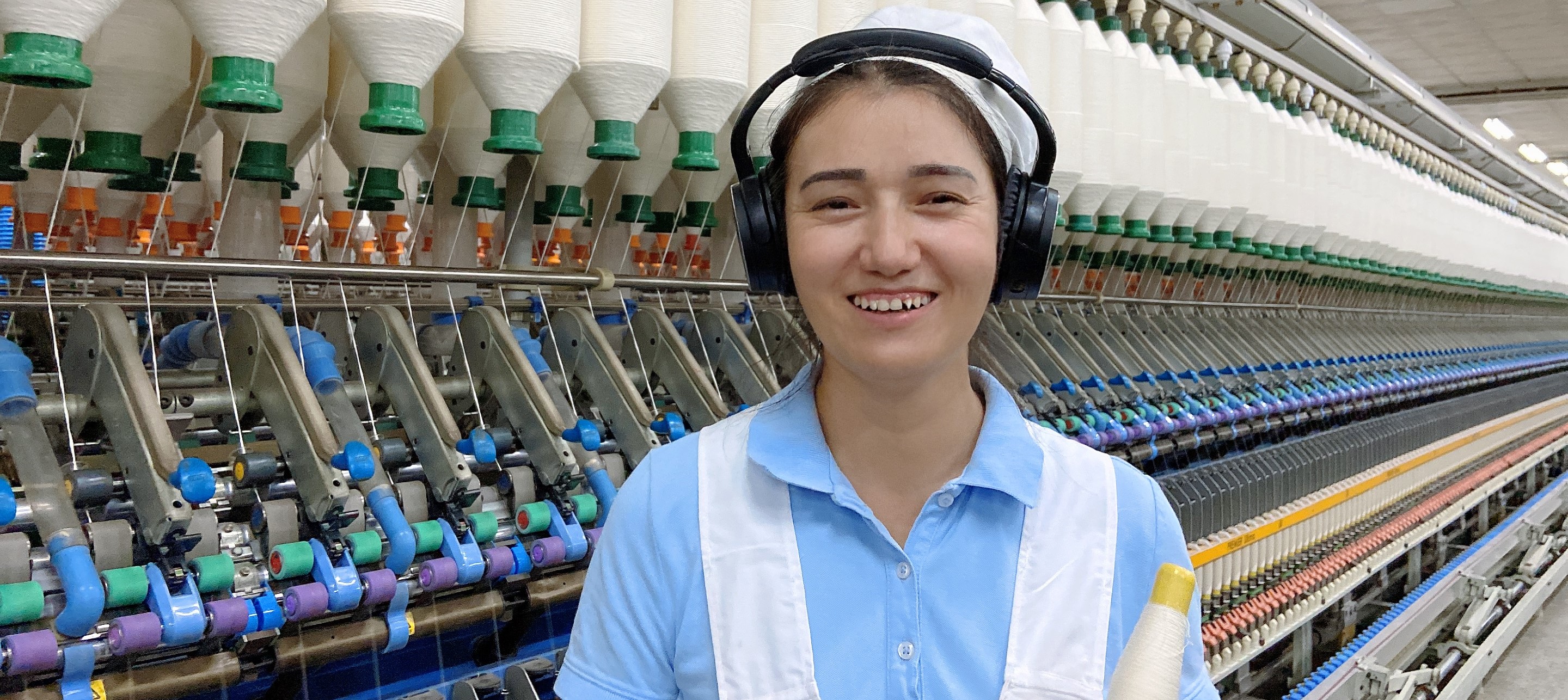
TESTIMONY
“My job at Esquel has brought me a lot. I am now earning more than US$725 a month and my family bought a house and a car. I also have a stronger say in the family because I am earning more than my husband.”
Gulijianaiti Abudureyimu, Doffer, a worker at Turpan Esquel Textile
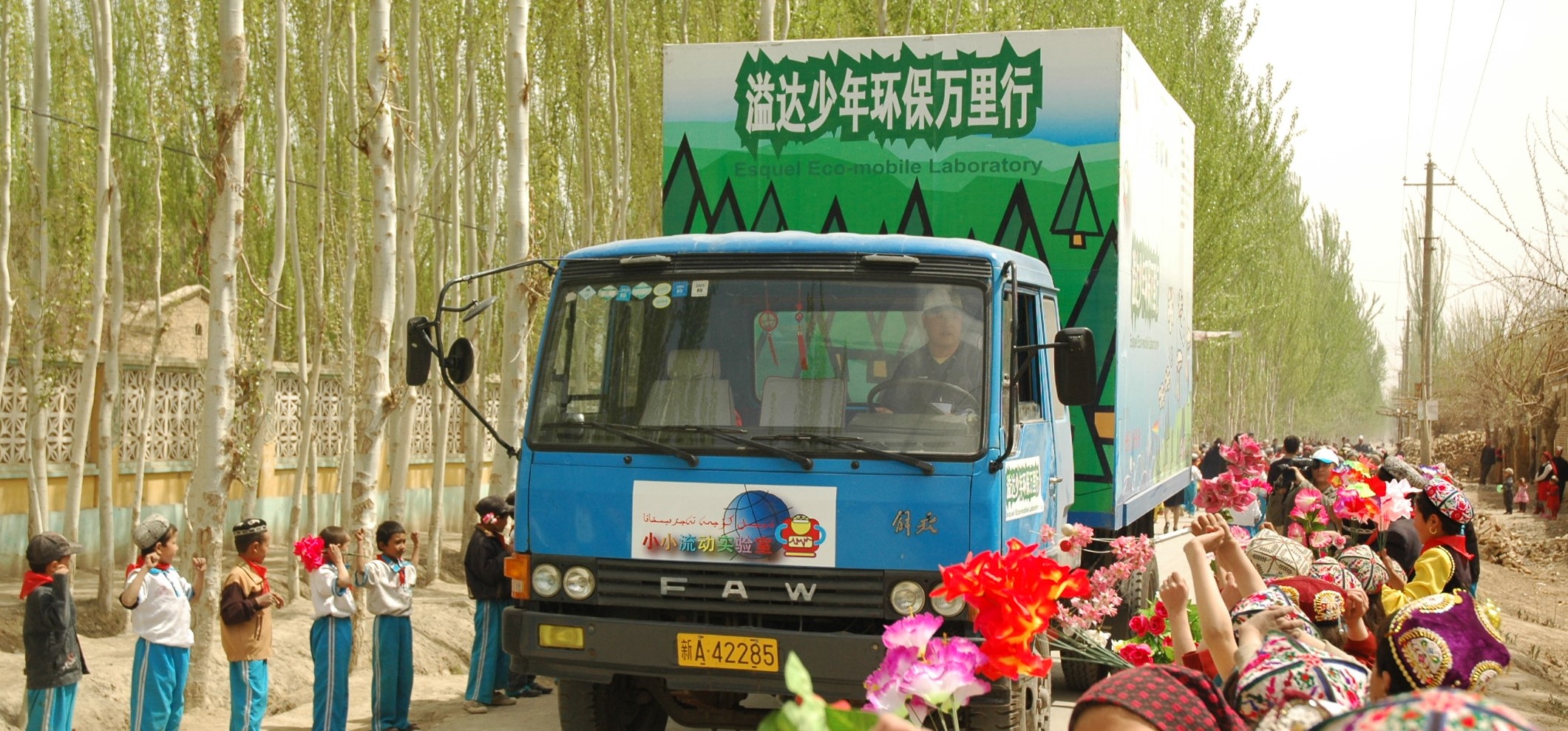
Rural communities in Xinjiang face significant challenges accessing educational resources.
Guided by our mission to "Encourage the Spirit of Learning", Esquel and the Esquel-Y.L. Yang Education Foundation have focused on helping ethnic minority children in rural communities gain better access to education and tools that will enrich their lives and open more learning and employment opportunities.
BETTER LEARNING ENVIRONMENT
Since 1997, Esquel has donated over US$560,000 and refurbished 22 schools in Xinjiang’s Hotan, Kashi, Aksu, Altay and Turpan, helping children gain easier and safer access to classroom learning.
Starting from 2002, we also proactively explored ways to broaden local children’s access to learning tools, while donating 300,000 library books to 1,100 schools. We personally engage with these students, encouraging them to “seek knowledge avidly, live to influence, work with acumen, and govern virtuously.” In 2004, the company launched Eco Mobile, an interactive classroom on wheels that has travelled across 18 counties, sharing knowledge about environmental science while educating students about environmental conservation.
DIVERSIFIED LEARNING PROGRAMS
Esquel launched the Summer Learning Program in 2007, which has provided instruction to more than 2,100 primary school students in rural Turpan on a broad range of subjects. We also have encouraged mentoring activities during summer holidays, a valuable tool for cultural exchange, by sponsoring 150 university volunteers from within China and overseas.
Since 2011, the Education Foundation has partnered with the Hong Kong Polytechnic University Department of Computing, expanding the Summer Learning and Cultural Exchange Program to include Science, Technology, Engineering and Mathematics (STEM) instruction. The Program also mobilized university volunteers to harness technology to benefit the underprivileged in rural Xinjiang. Utilizing robotics program software or apps, volunteers have taught children how to use computational thinking to develop problem formulation and solving capabilities.
FINANCIAL SUPPORT AND SCHOLARSHIPS
Esquel has been supporting students from rural area who face financial difficulties since 2003, providing subsidies for basic school expenses to over 4,400 primary students. Esquel’s employees also have formed the Esquel Scholarship, which has helped more than 800 students finish high school.
Esquel also established a program that provides monthly financial support to nearly 100 ethnic minority families in Urumqi where family members have been impacted by AIDS, ensuring that their children continued with their schooling.
The Education Foundation, moreover, launched the Hongzhi Students Program (宏志生项目) for high achievers in secondary schools who are at risk of dropping out of school due to financial difficulties at home.
Esquel is one of RacingThePlanet's longest supporters. Our partnership started in 2005 with our sponsorship of the Gobi March.
In 2013, in celebration of the 10-year anniversary of the Gobi March, RacingThePlanet contributed to the Education Foundation to set up of the Esquel-RacingThePlanet Scholarship Program, which identifies talented teenagers from ethnic minority communities who excel in academics and sports. The program allows these students to attend university and provides them with opportunities for broadening their cultural and interpersonal development.
Esquel understands that rural communities in Xinjiang have limited access to healthcare. In some places, there also is a lack of awareness about the importance of proper hygiene and disease prevention. To support these rural areas and improve the wellbeing of people living there, Esquel and the Education Foundation have partnered with non-profit organizations, educational institutions, pharmaceutical companies, and local health authorities.
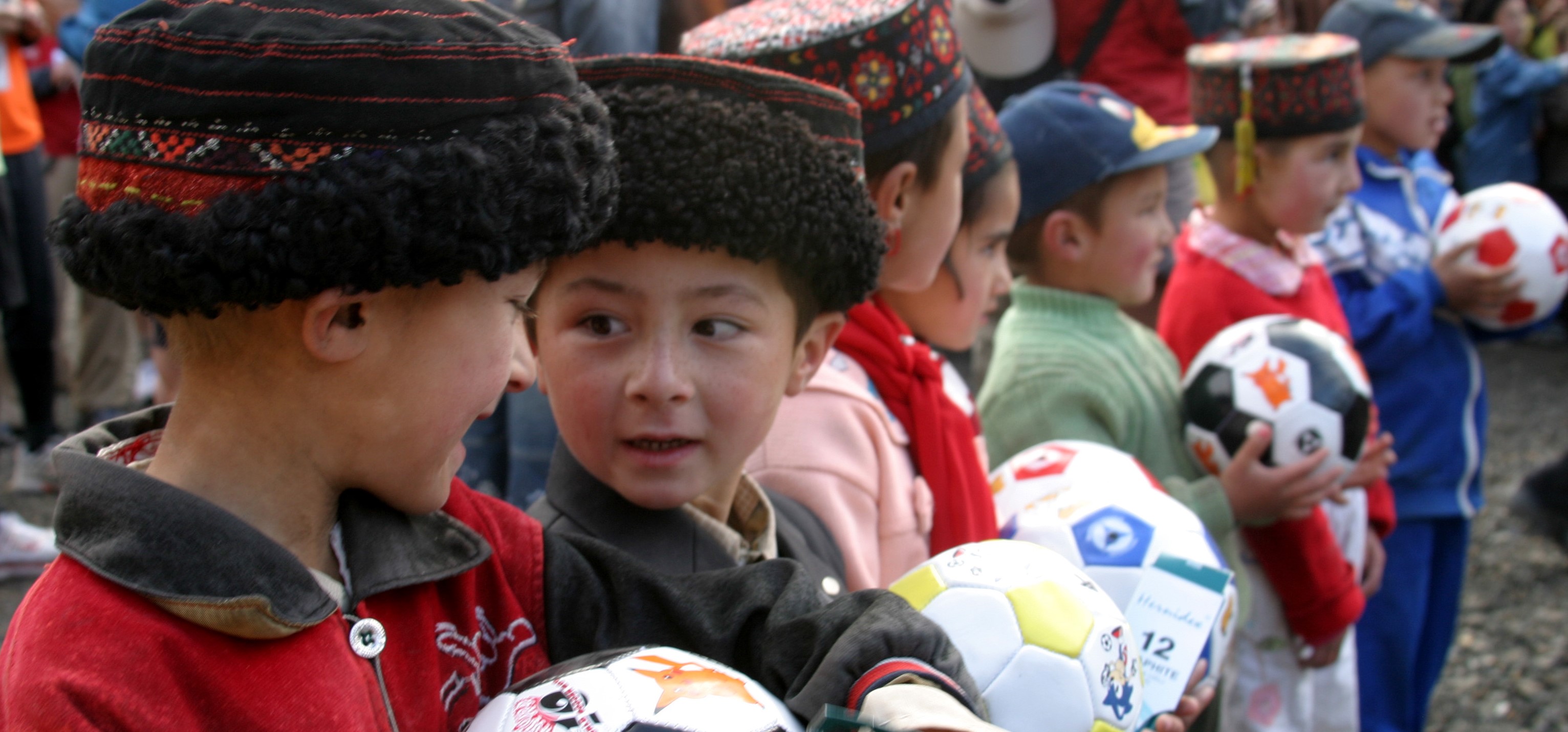
OPERATION SMILE
Esquel understands families with children suffering from facial deformities in Xinjiang may not be able to receive medical care because it is too costly or far away. Some facial deformities are present at birth and can be fatal, and if a child survives, they may face bullying and social isolation.
Since 2005, Esquel has partnered with RacingThePlanet to bring medical missions from Operation Smile (a non-profit medical services organization) to Xinjiang to provide safe facial reconstruction surgeries to children in need.
VISION SCREENING PROGRAM
Good vision is key to learning, but unfortunately many children in rural communities in Xinjiang have never had the benefit of screening or eye care services. Since 2012, the Education Foundation has provided free eye examinations to over 8,000 students living in remote parts of Xinjiang. More than 2,700 pairs of eyeglasses have been given to those in need, while surgery and treatment has been provided to over 250 students, giving them vision for a brighter future.
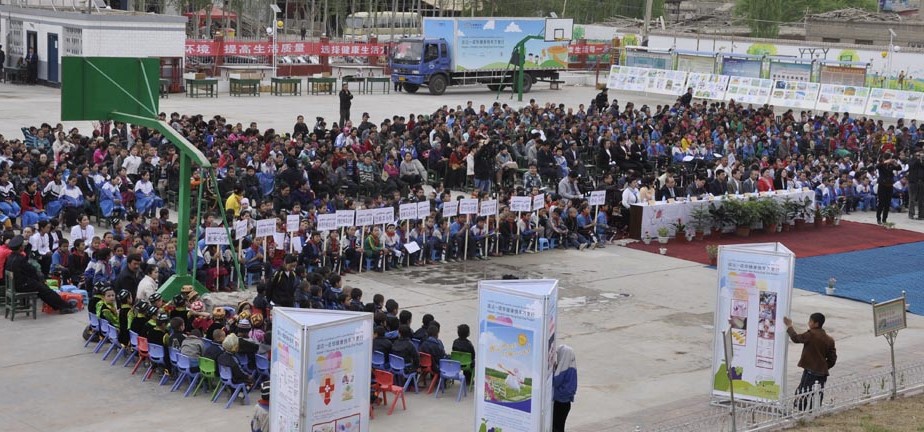
ESQUEL-NOVARTIS HEALTH EXPRESS PROJECT (JIAN KANG KUAI CHE)
In some rural parts of Xinjiang, there is still a lack of awareness about hygiene and disease prevention, such as the importance of boiling drinking water or not eating food out of unclean hands. The harmful effects of smoking and poor diets are also often overlooked.
In 2010, the Education Foundation partnered with pharmaceutical company Novartis and the local health and education bureau to introduce health education in rural Xinjiang via the Health Express Project (Jian Kang Kuai Che). The Project has provided resources to introduce health education curriculums to classrooms, as well as organizing competitions and exhibitions to spread health messages among children and their communities. The outreach has included 161 schools and 300,000 students and has provided a basic understanding of hygiene and disease prevention to many rural areas.
Joe Jimenez, Novartis’s former chief executive officer, spoke with the Financial Times about the Project, noting that simply donating medicines to those in need is no longer enough; it’s now more important to transfer knowledge than transfer cash.
TESTIMONY
“Today I received my new glasses from Esquel-Y. L. Yang Education Foundation. I am overjoyed because I no longer have to squint my eyes to see what is written on the blackboard. I am very grateful to the Foundation for giving me an eye examination and free new glasses.”
Gulimire, a 4th grader at the Keping Huzhou Bilingual Elementary school and a program beneficiary receiving free glasses from the project.
Esquel is known as a “game changer” in Xinjiang, by turning the practice of cotton procurement upside-down and fundamentally improving people’s lives in their local communities. Over the course of building a viable cotton operation, Esquel has empowered local farmers by paying them in cash in cotton purchase and by initiating a micro-finance program to help them overcome cashflow problems. We also have worked closely with local farmers to improve their skills and practices. Our efforts have created a stable supply of high-quality cotton for our customers, while encouraging our suppliers to grow cotton in a sustainable way. This success has been documented by well-established third-party experts.

BUILDING A VERTICALLY-INTEGRATED SUPPLY CHAIN
Since quality cotton is an irreplaceable factor in the production quality shirts, Esquel made the decision to build a vertically-integrated supply chain. That included investing in R&D on cotton seeds and supporting farmers on sustainable cotton cultivation in Xinjiang to control the quality of the products at the source.
Esquel, since our arrival in Xinjiang over 20 years ago, began paying farmers in cash directly at the time of purchase, overturning the long-standing practice of cotton buyers paying with IOUs. That eliminated uncertainty and ensured the development of a mutually beneficial and sustainable partnership with local farmers. Esquel also provided farmers with purchase commitments before the cotton was even planted, which secured supply and guaranteed that cotton was grown according to the company’s specification.
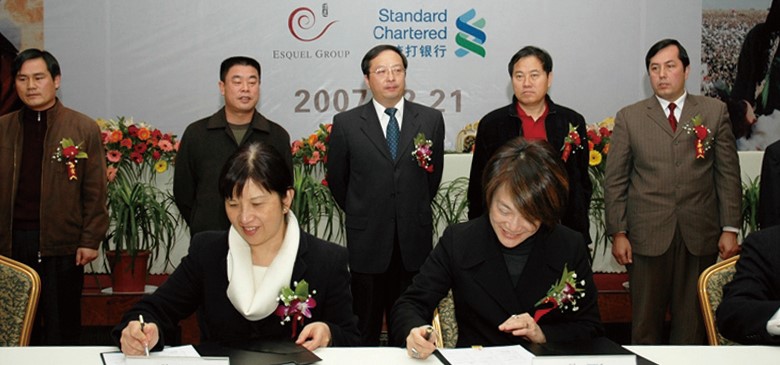
MICRO-FINANCING PROGRAM FOR COTTON FARMERS
In Xinjiang. Esquel is a partner to local farmers and provides loans to growers facing seasonal and cashflow problems. When Esquel first started buying cotton supply for its two cotton ginning mills in Xinjiang, farming conditions were less than favorable. Cotton farmers lacked capital and found it difficult to apply for loans, which limited their ability to improve cotton quality.
In 2007, Esquel partnered with Standard Chartered Bank to provide individual family farmers with access to micro-financing. Over the years, we have provided nearly 2,000 local farmers about US$2.76 million in loans. No bad debt has ever occurred during the ten-year program.
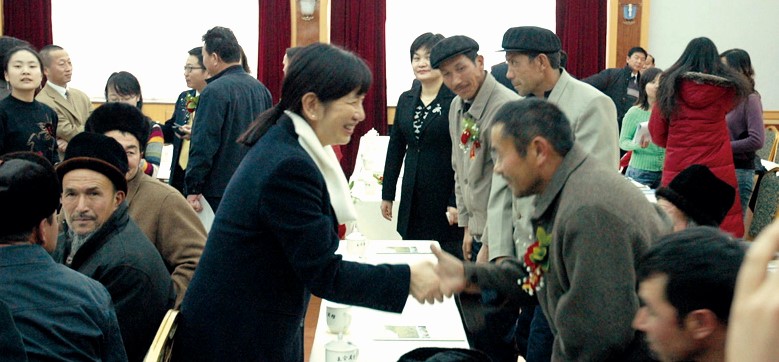
The micro-finance program has effectively increased local access to financial services, providing cotton farmers with working capital to enhance productivity, as well as improved their living standards, according to Katherine Tsang, former Executive Vice Chairman and CEO of Standard Chartered Bank (China) Limited.
Every year, Esquel brings in different experts to share their knowledge with local farmers, demonstrating the latest techniques for planting high quality cotton or skills to manage their money. Few enterprises take their commitment to social responsibility as seriously as Esquel.
TESTIMONY
“Esquel would risk anything but the trust of the cotton farmers. Stacks of banknotes worth US$737,000 piling up in the finance office was a daily sight. We needed to have at least that amount of money each day – just in case many farmers arrived on the same day. If we didn’t have enough cash, farmers would certainly accuse Esquel of being dishonest.”
Calvin Tsang, Managing Director of Esquel Group who led a local cotton purchase team in Awati, Xinjiang
TESTIMONY
“I trusted Esquel because Esquel trusted me. They believed I worked hard and could make a better life myself. People in Awati particularly liked Esquel because of its credible, transparent purchasing policy. They treated every farmer equally, offering good prices for good quality cotton regardless of quantity; they never issued ‘blank receipts’. They were happy to offer me a loan without any mortgage or credit records; they really showed a lot of trust in me.”
Ai Mai Ti Sai Mai Ti, a local cotton farmer who participated in the micro-finance program

Esquel: An Economics of Mutuality Case Study (2018)
The Saïd Business School, the University of Oxford: “Esquel has been at the forefront of promoting and building a business ecosystem for sustainable cotton clothing. Within the cotton supply chain, Esquel entered into partnerships with farmers. This resulted in the doubling of yields in organic cotton farms. Investments in reducing the environmental impact of cotton production and textile manufacturing ultimately help protect both farmers and the company. This initiative and long-term commitment to its farmers has secured Esquel’s supply and made it more resilient.”

Esquel Group: Building a Sustainable Partnership with Cotton Farmers in Xinjiang (2010)
Harvard Business School: “Seeking to secure a large supply of specialty cotton in an ethical and socially responsible fashion, Esquel undertook a major 2002 initiative to negotiate value-creating contracts among itself, local Xinjiang municipal governments, and cotton farmers. Aware that contract enforcement in China can be challenging, Esquel offered the region's poor, often-suspicious farmers attractive advanced financing, guaranteed minimum pricing, and other generous terms in return for an agreement to sell their crop exclusively to Esquel.”

Esquel Group: A Vertically Integrated Apparel Manufacturer (2007)
Stanford Graduate School of Business: “In the midst of the business success, the company’s chairman, Marjorie Yang, emphasized the importance of achieving the growth goals without giving up their culture and values. Monetary return was not enough; their mission was to create a company where everybody was happy, and in parallel to bring about a positive change in society. Only then would the business be considered a successful one.”
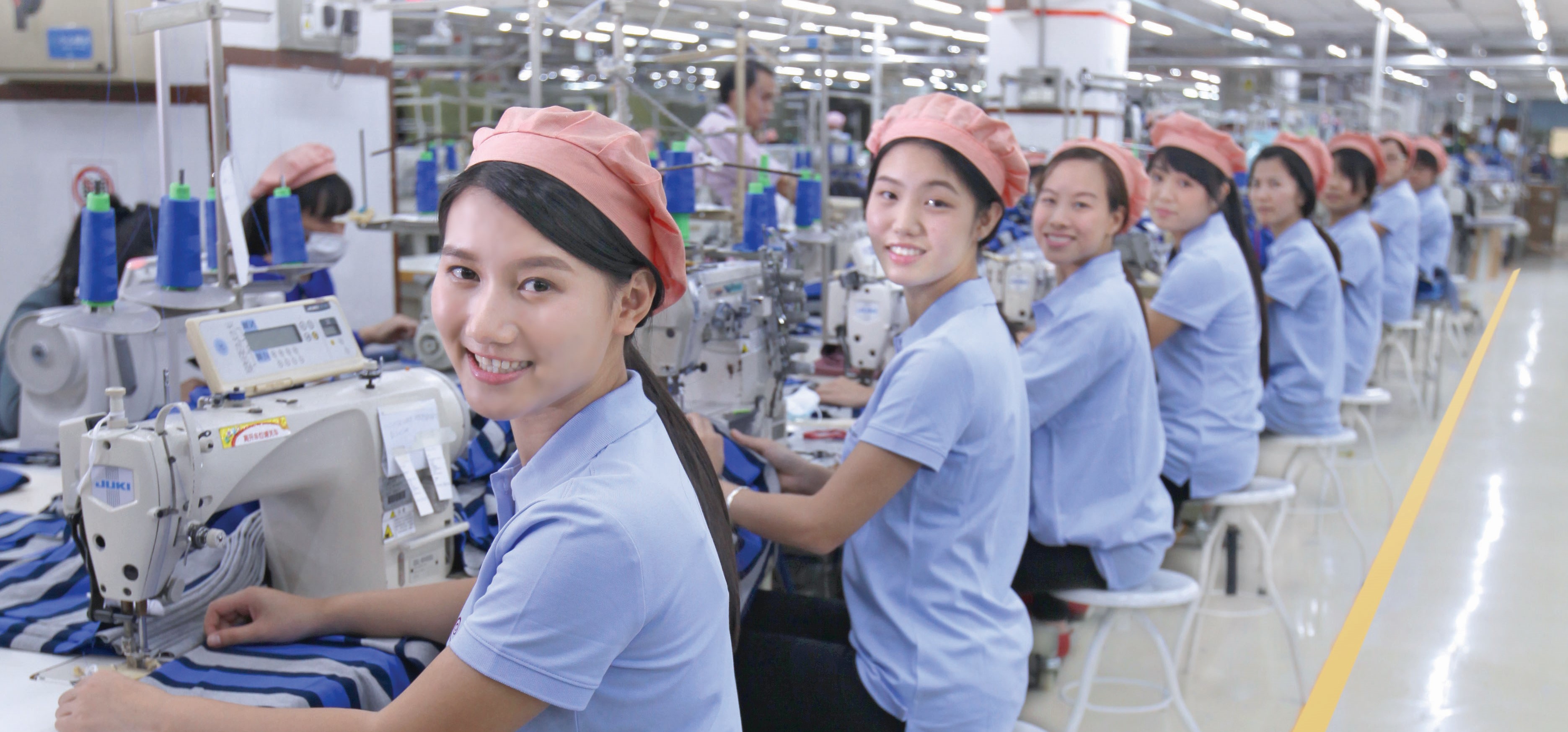
Don’t Tweak Your Supply Chain – Rethink It End to End (2010)
Harvard Business Review: “Esquel changed its supplier-customer relationships with independent farmers to be more like partnerships. For example, to enable farmers to invest in the new techniques, it teamed up with Standard Chartered Bank to provide microfinancing. And to decrease their risks, it started to place orders for cotton when it was planted and guaranteed payment of whichever price turned out to be higher at harvest—a company-set minimum or the prevailing market price.”
RELATED LINKS
• The Story of a Shirt
• From Making Shirts to Making a Difference
• I'm Going to Xinjiang

The Story of a Shirt
A reporter of The Times charts the odyssey of a shirt from the cotton field in Shaya, Xinjiang, through Esquel’s factories, to the finished article on a London high street.

From making shirts to making a difference
Esquel talks to Just-Style about how their micro-finance program helped local cotton farmers, as well as other initiatives the company has launched in Xinjiang.

I'm Going to Xinjiang
Esquel Chairman Marjorie Yang in a documentary shares how Esquel started its business in Xinjiang and created a positive impact on the community.

